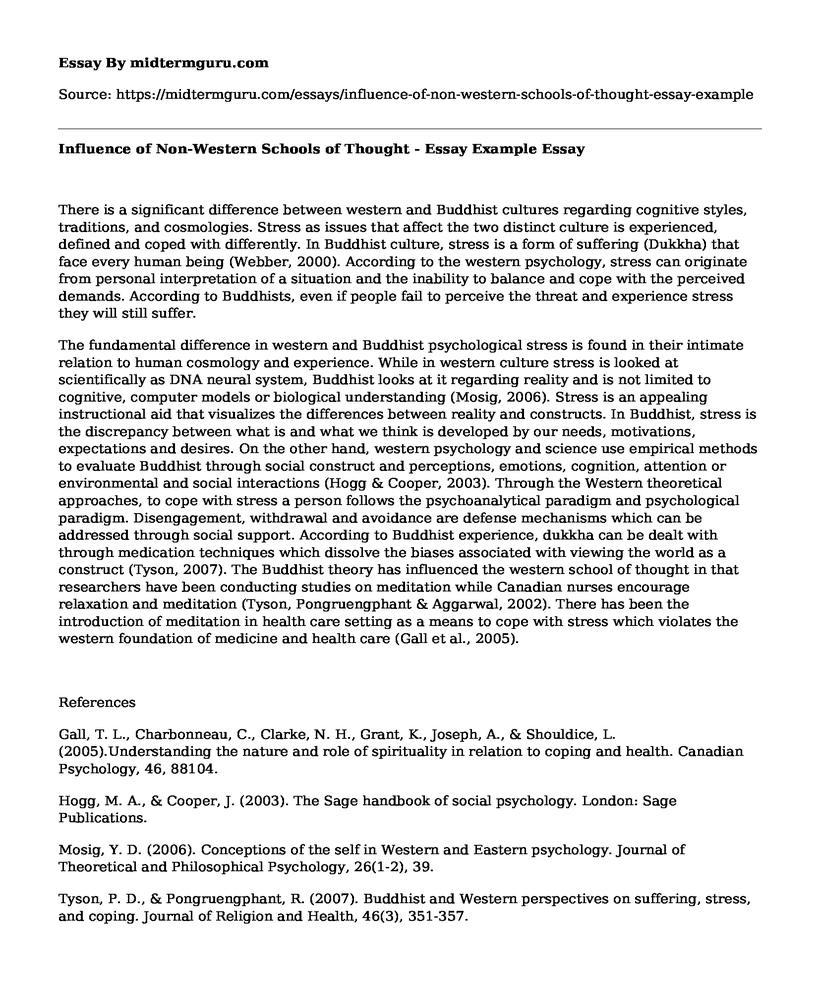There is a significant difference between western and Buddhist cultures regarding cognitive styles, traditions, and cosmologies. Stress as issues that affect the two distinct culture is experienced, defined and coped with differently. In Buddhist culture, stress is a form of suffering (Dukkha) that face every human being (Webber, 2000). According to the western psychology, stress can originate from personal interpretation of a situation and the inability to balance and cope with the perceived demands. According to Buddhists, even if people fail to perceive the threat and experience stress they will still suffer.
The fundamental difference in western and Buddhist psychological stress is found in their intimate relation to human cosmology and experience. While in western culture stress is looked at scientifically as DNA neural system, Buddhist looks at it regarding reality and is not limited to cognitive, computer models or biological understanding (Mosig, 2006). Stress is an appealing instructional aid that visualizes the differences between reality and constructs. In Buddhist, stress is the discrepancy between what is and what we think is developed by our needs, motivations, expectations and desires. On the other hand, western psychology and science use empirical methods to evaluate Buddhist through social construct and perceptions, emotions, cognition, attention or environmental and social interactions (Hogg & Cooper, 2003). Through the Western theoretical approaches, to cope with stress a person follows the psychoanalytical paradigm and psychological paradigm. Disengagement, withdrawal and avoidance are defense mechanisms which can be addressed through social support. According to Buddhist experience, dukkha can be dealt with through medication techniques which dissolve the biases associated with viewing the world as a construct (Tyson, 2007). The Buddhist theory has influenced the western school of thought in that researchers have been conducting studies on meditation while Canadian nurses encourage relaxation and meditation (Tyson, Pongruengphant & Aggarwal, 2002). There has been the introduction of meditation in health care setting as a means to cope with stress which violates the western foundation of medicine and health care (Gall et al., 2005).
References
Gall, T. L., Charbonneau, C., Clarke, N. H., Grant, K., Joseph, A., & Shouldice, L. (2005).Understanding the nature and role of spirituality in relation to coping and health. Canadian Psychology, 46, 88104.
Hogg, M. A., & Cooper, J. (2003). The Sage handbook of social psychology. London: Sage Publications.
Mosig, Y. D. (2006). Conceptions of the self in Western and Eastern psychology. Journal of Theoretical and Philosophical Psychology, 26(1-2), 39.
Tyson, P. D., & Pongruengphant, R. (2007). Buddhist and Western perspectives on suffering, stress, and coping. Journal of Religion and Health, 46(3), 351-357.
Tyson, P. D., Pongruengphant, R., & Aggarwal, B. (2002). Coping with organizational stress among hospital nurses in Southern Ontario. International Journal of Nursing Studies, 39, 453459.
Webber, M. (2000). Why meditate? A heart song of vast release. Kinmount, Canada: BodhiPublishing.
Cite this page
Influence of Non-Western Schools of Thought - Essay Example. (2021, Jun 03). Retrieved from https://midtermguru.com/essays/influence-of-non-western-schools-of-thought-essay-example
If you are the original author of this essay and no longer wish to have it published on the midtermguru.com website, please click below to request its removal:
- Essay Example: Carlos Problem Which Is Anger
- Anxiety and Depression - Psychology Paper Example
- Feelings of Rejection - Assignment Example
- Essay Sample on Three Unanswered Questions about Faith, Morals, and Ethics
- Pursuit of Happiness - Essay Sample
- 3 Types of Stress: Acute, Episodic Acute & Chronic. Tips for Management - Essay Sample
- Paper Example on Mental Health among the LGBTI Community







